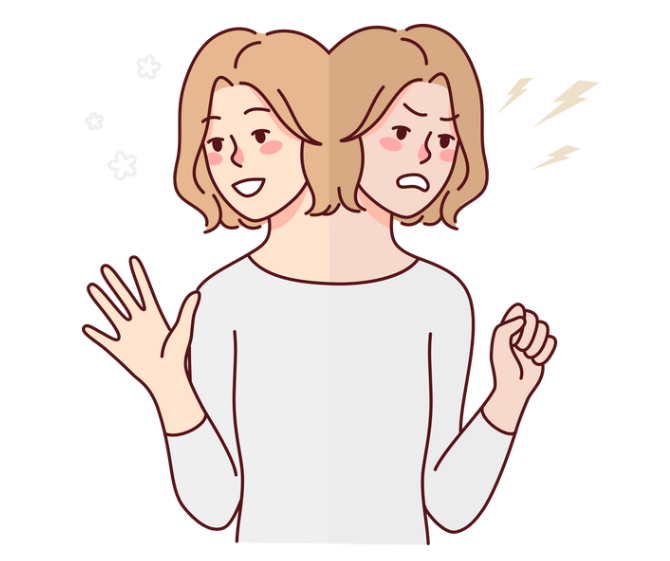Understanding Bipolar Disorder: Signs, Symptoms, Types, Causes,
Diagnosis and Treatment Options
What is it:
Bipolar Disorder, formerly known as manic depression, is a mental health disorder characterised by
mood swings, ranging from emotional highs (mania or hypomania) to lows (depression). These mood swings
can significantly impact various aspects of life, including sleep, energy levels, judgement, behaviour
and clear thinking. Episodes can occur infrequently or frequently, with onset typically between 15 to
20 years, rarely after 40 years and affecting both genders equally.
Signs and Symptoms of Bipolar Disorder:
The symptoms of Bipolar Disorder can vary, encompassing mood swings known as mood episodes.
- Manic episode symptoms: Feeling excited and energetic, sudden shifts to
irritability and short temper, restlessness, rapid thought and speech, increased energy, heightened
libido, unrealistic plans, poor judgement, substance abuse, impulsiveness, reduced need for sleep
and appetite, inflated self-confidence and easy distraction.
- Depressive episode symptoms: Intense sadness, hopelessness, and loneliness, slow
speech or forgetfulness, trouble concentrating, talking slowly, depressed libido, inability to feel
pleasure, uncontrollable crying, trouble making decisions, irritability, needing more sleep or
insomnia, appetite changes leading to weight loss or gain and thoughts of death or suicide.

Some patients may experience both manic as well as depressive symptoms together, feeling very sad,
empty or hopeless while also experiencing extreme energy.
Note: Experiencing four or more episodes of mania or depression in a year
is termed
"rapid cycling."
Risk factors of Bipolar Disorder:
Bipolar Disorder is believed to develop from a combination of factors:
- May affect individuals with a family history of the condition.
- Imbalances in neurotransmitters or hormones may play a role.
- Life events such as abuse, mental stress, significant loss, or other traumatic events may trigger
an initial episode.
How is Bipolar Disorder diagnosed:
Bipolar Disorder is typically diagnosed through observation of behavioural patterns by family
members, but accurate diagnosis requires assessment by mental health professionals trained in
psychiatric conditions. These professionals employ various tools including:
- Medical history which will include asking about patient symptoms, lifetime
history, experiences and family history.
- Medical tests to rule out other underlying conditions.
- Psychological assessment to evaluate thoughts, feelings and behavioural patterns
through interviews, questionnaires and mood charting to monitor mood changes over time. With the
patient's consent, caregivers, family members, and close friends may be asked to provide information
about the patient’s symptoms.
Treatment options for Bipolar Disorder:
Treatment aims to stabilise the person’s mood and reduce the severity of symptoms. The main
treatments for Bipolar Disorder include medicines, psychotherapies and lifestyle changes. Always seek
professional guidance or treatment from
Mental Health Professionals.
- Medications: Antipsychotic drugs, mood stabilisers and antidepressants are
prescribed to alleviate symptoms. Do not self-medicate, miss, adjust or stop medications
independently or without a doctor's advice.
- Psychotherapy: Talk therapy methods like Cognitive Behavioural Therapy (CBT) can
help prevent symptom recurrence, manage routines, develop coping skills, address learning
difficulties, resolve social problems and help strengthen family bonds and communication. It can
also treat substance abuse problems. Other therapies can be used in cases where standard treatments
prove ineffective.
- Psychoeducation: Educates patients and their caregivers and families about
Bipolar Disorder, its symptoms, triggers, and effective coping strategies.
- Support system: Involving caregivers, family members, close friends and teachers
(if the client is a child) as active participants in the treatment process creates a supportive
ecosystem that enhances the individual's ability to manage Bipolar Disorder effectively.
Lifestyle changes that help to cope with Bipolar Disorder:
While there is no known way to prevent Bipolar Disorder, following these lifestyle changes will help
to reduce patterns of behaviour that worsen the symptoms in patients.
- Avoid alcohol, recreational drugs, caffeine and tobacco as they can worsen symptoms and interfere
with medications.
- Maintain a daily mood chart or diary to track thoughts, feelings and behaviours, aiding in
treatment awareness.
- Stick to a consistent sleep schedule to minimise disruptions that can trigger mood episodes.
- Share your feelings with caregivers, friends and family members so they can provide emotional
support. Seek support or assistance from your friends, family, caregiver or whoever is near you
during a severe attack or when you struggle to manage them.
- Practice relaxation techniques to reduce stress such as mindfulness, meditation, yoga or
deep-breathing exercises. Engage in activities and hobbies that bring joy and relaxation.
Lifelong treatment is essential, ensuring symptom management and supporting a healthy, successful
life. In India, you can contact the mental health helpline Tele MANAS at 14416 OR 1-800
891 4416
available every day of the week and offering support in multiple languages for guidance and support.

